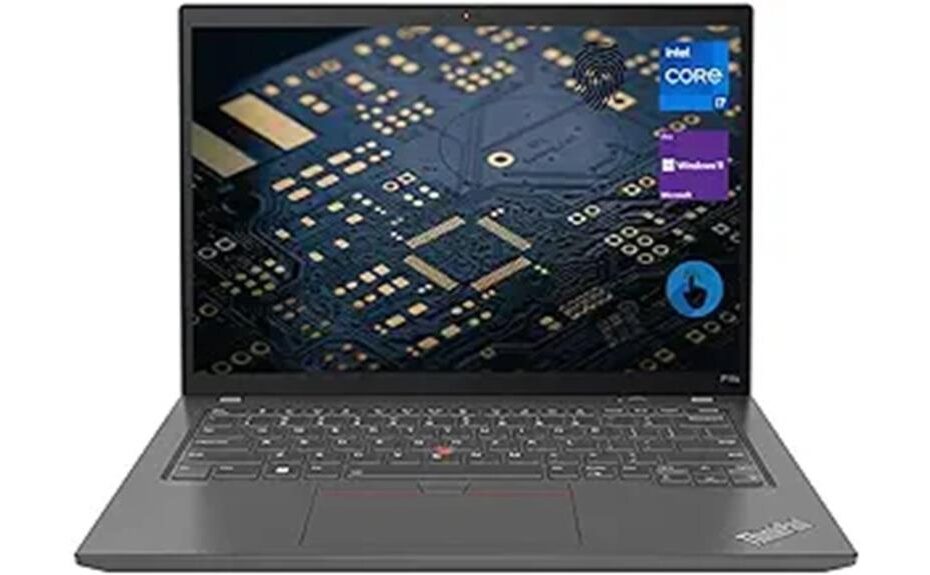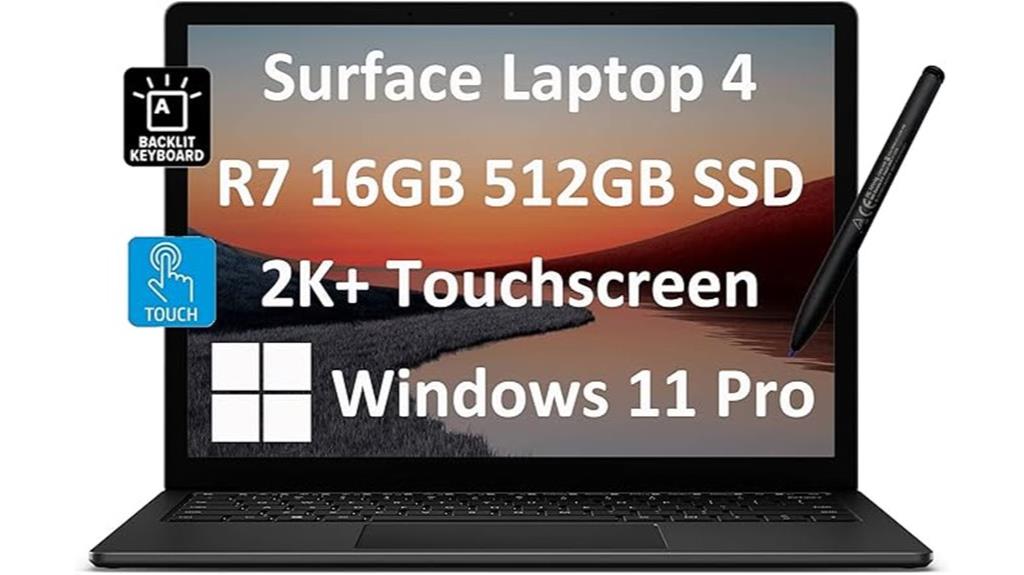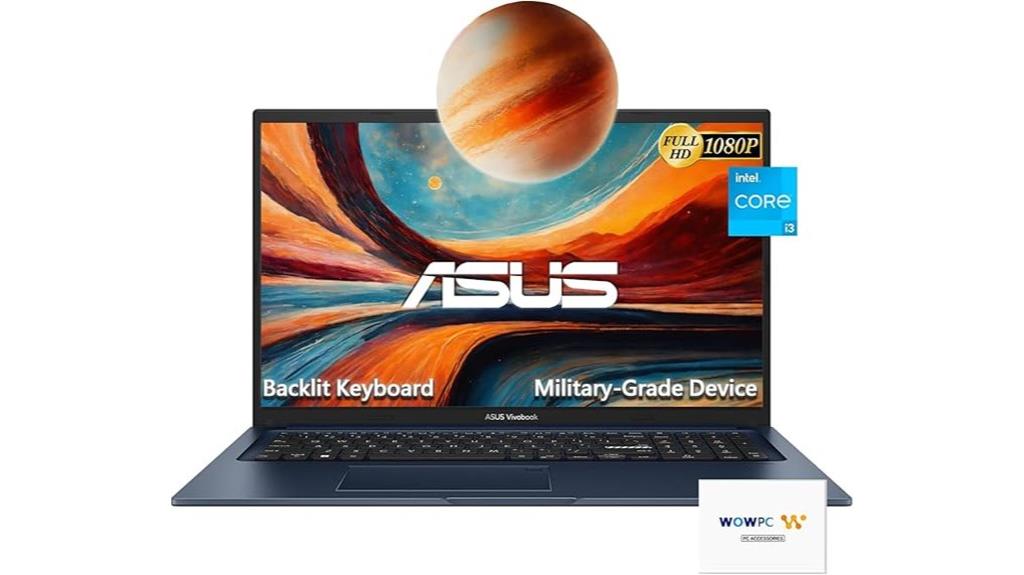

The Lenovo ThinkPad P14s Gen 3 presents a compelling blend of performance and portability, featuring a 12th Gen Intel Core i7 processor, 32GB RAM, and a 1TB SSD, tailored for demanding professional tasks. Its compact, durable design and extensive connectivity options make it a versatile choice for on-the-go users. However, the device is not without its flaws, including inconsistent battery life, frequent boot failures, and SSD reliability concerns. While its specifications are impressive, these issues raise questions about its long-term dependability. To fully assess its value, a closer examination of its strengths and weaknesses is essential.
Key Takeaways
- Pros: Powerful 12th Gen Intel Core i7 processor, 32GB RAM, and 1TB SSD for seamless multitasking and fast performance.
- Pros: Compact, lightweight design with a durable chassis, ideal for portability and on-the-go professionals.
- Pros: Excellent security features, including fingerprint reader, IR camera, and MIL-STD 810H durability testing.
- Cons: Poor battery life, lasting only 2 hours under minimal use, with rapid degradation reported.
- Cons: Frequent boot failures, overheating, and SSD reliability issues, leading to costly repairs and limited warranty coverage.
##
The Lenovo ThinkPad P14s Gen 3 is equipped with a 14-inch FHD+ (1920 x 1200) IPS touchscreen display featuring anti-glare technology, a brightness of 300 nits, and a 60Hz refresh rate. Despite its robust specifications, including a 12th Gen Intel Core i7 processor and 32GB RAM, the laptop exhibits significant issues with battery performance and boot reliability. Users report that the battery life degrades rapidly, lasting only 2 hours after minimal use, falling short of the advertised 5-hour benchmark. Additionally, the device frequently fails to boot, displaying a "Recovery Failed" error or encountering blue screen errors during startup. These persistent problems undermine the laptop's reliability, particularly for professionals requiring consistent performance. While the hardware specifications are commendable, the inconsistent battery performance and boot reliability detract from its overall usability. The MIL-STD 810H durability testing ensures the device can withstand harsh conditions, but these internal issues remain a significant drawback.
Features and Benefits
The Lenovo ThinkPad P14s Gen 3 features a 14-inch FHD+ IPS touchscreen display with anti-glare technology, offering sharp visuals and usability in various lighting conditions. Powered by a 12th Gen Intel Core i7 processor, it delivers robust performance with 12 cores and 16 threads, supported by 32GB of high-bandwidth RAM and a 1TB PCIe NVMe M.2 SSD for fast data access and multitasking efficiency. These specifications make it a strong contender for professionals seeking a balance of portability and productivity. The laptop also includes BIOS-level protection to safeguard against malicious attacks during startup, ensuring comprehensive security for sensitive data.
4 Fhd+ IPS Touchscreen Display
Featuring a 14-inch FHD+ (1920 x 1200) IPS touchscreen, the Lenovo ThinkPad P14s Gen 3 offers a sharp and responsive display designed for productivity. The display clarity is exceptional, with vibrant colors and wide viewing angles, making it ideal for detailed work and multimedia consumption. The anti-glare coating reduces reflections, enhancing usability in bright environments. Touch responsiveness is precise, enabling seamless interaction for tasks like note-taking or moving through applications. While the 300-nit brightness is adequate for indoor use, it may struggle in direct sunlight. The 60Hz refresh rate guarantees smooth visuals, though it lacks the higher refresh rates found in gaming-focused displays. Overall, the FHD+ IPS touchscreen combines functionality and quality, catering to professionals who value both performance and usability.
2th Gen Intel Core I7
Powered by the 12th Gen Intel Core i7-1260P processor, the Lenovo ThinkPad P14s Gen 3 delivers robust performance tailored for demanding workloads. This 12-core, 16-thread processor operates at a base frequency of 1.5 GHz, with a maximum turbo frequency of 4.7 GHz, ensuring efficient multitasking and responsiveness. The 18MB Intel Smart Cache enhances processor performance by reducing latency and accelerating data access. However, thermal management remains a critical consideration, as sustained high-performance workloads can lead to thermal throttling, impacting efficiency. The hybrid architecture of the 12th Gen Intel Core i7 balances power and efficiency cores, optimizing energy consumption without compromising speed. While the processor excels in handling complex tasks, users should monitor thermal performance to maintain consistent operation under heavy usage scenarios.
2GB High-Bandwidth RAM
With 32GB of high-bandwidth RAM, the Lenovo ThinkPad P14s Gen 3 guarantees seamless multitasking and efficient handling of memory-intensive applications. The RAM speed optimization secures rapid data access and reduced latency, enhancing performance for demanding workflows such as data analysis, virtualization, and software development. This configuration is particularly beneficial for professionals requiring consistent responsiveness across multiple applications. While the 32GB capacity is ample for most users, the laptop also offers memory upgrade options, allowing for future scalability to meet evolving needs. The high-bandwidth design supports faster data transfer rates, complementing the system's overall efficiency. However, users should verify compatibility and warranty terms before pursuing upgrades. This feature positions the P14s Gen 3 as a robust choice for productivity-focused professionals.
TB PCIe NVMe M.2 SSD
The 1TB PCIe NVMe M.2 SSD in the Lenovo ThinkPad P14s Gen 3 delivers exceptional storage performance, leveraging PCIe technology for high-speed data transfer and reduced latency. This SSD guarantees rapid boot times, quick application launches, and efficient multitasking, making it ideal for demanding workloads. NVMe compatibility further enhances ssd performance by optimizing data throughput and minimizing bottlenecks. The 1TB capacity provides ample space for large files, applications, and datasets, catering to professionals in finance, business, and creative fields. However, users should note potential reliability concerns, as some units have experienced boot failures, necessitating SSD replacements. Despite these issues, the SSD remains a standout feature, offering a balance of speed, capacity, and efficiency for high-performance computing needs.
Product Quality
Although the Lenovo ThinkPad P14s Gen 3 boasts premium specifications such as a 12th Gen Intel Core i7 processor and 32GB RAM, its product quality is marred by significant reliability issues. The build quality, while adhering to ThinkPad's traditional rugged design, falls short in durability testing, with reports of boot failures and repeated blue screens during startup. These issues suggest potential flaws in component integration or firmware stability. Additionally, the battery's rapid degradation—lasting only 2 hours after 2 months of use—raises concerns about long-term performance. While the chassis and keyboard maintain a professional aesthetic, the internal hardware's inconsistency undermines the device's overall reliability. Such shortcomings highlight a disconnect between the laptop's premium specifications and its real-world durability, impacting its suitability for demanding professional use. The inclusion of a fingerprint reader for secure access, as seen in the ThinkPad E14 Gen 5, could have enhanced the P14s Gen 3's security features, aligning it more closely with modern professional standards.
What It's Used For
The Lenovo ThinkPad P14s Gen 3 is designed for business and finance tasks, leveraging its 12th Gen Intel Core i7 processor and 32GB RAM for efficient multitasking and productivity. Its compact 14-inch form factor and lightweight design make it suitable as a portable workstation for professionals on the go. However, reported battery and boot issues may limit its reliability for extended use in demanding environments. The WUXGA display resolution ensures sharp visuals and accurate color representation, enhancing productivity for tasks requiring detailed visuals.
Business and Finance Tasks
Designed to handle demanding business and finance tasks, the Lenovo ThinkPad P14s Gen 3 is equipped with a 12th Gen Intel Core i7-1260P processor and 32GB of RAM, ensuring smooth multitasking and efficient data processing. The laptop excels in data analysis and financial modeling, leveraging its 12-core processor and high-bandwidth memory to manage complex calculations and large datasets with ease. The 1TB PCIe NVMe SSD provides rapid access to critical files, while the FHD+ IPS touchscreen offers clarity for detailed spreadsheets and financial reports. Despite its robust performance, users should note potential hardware issues, such as battery degradation and boot failures, which could disrupt workflow. For professionals in finance, the ThinkPad P14s Gen 3 delivers reliable performance, though durability concerns may warrant caution.
Multitasking and Productivity
With its 12th Gen Intel Core i7-1260P processor and 32GB of high-bandwidth RAM, the Lenovo ThinkPad P14s Gen 3 is optimized for multitasking and productivity, enabling users to efficiently manage multiple applications simultaneously. The 12-core, 16-thread CPU guarantees smooth performance across demanding workflows, while the ample RAM supports seamless task management efficiency, even with resource-intensive software. The device excels in software compatibility testing, handling a wide range of professional applications without bottlenecks. Its 1TB PCIe NVMe SSD further enhances responsiveness, reducing load times and improving overall workflow. However, users should note potential battery limitations, as extended multitasking sessions may require frequent charging. For professionals requiring robust multitasking capabilities, the ThinkPad P14s Gen 3 delivers reliable performance, though its battery life may impact prolonged productivity.
Portable Workstation Use
Although primarily marketed as a business laptop, the Lenovo ThinkPad P14s Gen 3 serves as a capable portable workstation for professionals in fields such as engineering, design, and data analysis. Its 12th Gen Intel Core i7 processor and 32GB RAM guarantee smooth handling of resource-intensive applications like CAD software and data modeling tools. The 1TB SSD provides ample storage for large datasets and project files, while Thunderbolt 4 ports enable high-speed connectivity for external GPUs or displays. However, its battery performance is a limitation, lasting only 2-3 hours under heavy workloads, which may hinder travel convenience. The compact 14-inch form factor and lightweight design make it suitable for on-the-go use, though users should plan for frequent charging during extended work sessions away from power sources.
Product Specifications
The Lenovo ThinkPad P14s Gen 3 is equipped with a 14-inch FHD+ (1920 x 1200) IPS touchscreen display featuring anti-glare technology, a brightness of 300 nits, and a 60Hz refresh rate. The display resolution guarantees sharp visuals, while the touchscreen responsiveness is precise, catering to productivity tasks. Powered by a 12th Gen Intel Core i7-1260P processor with 12 cores and 16 threads, it delivers robust performance. The device includes 32GB of high-bandwidth RAM and a 1TB PCIe NVMe M.2 SSD for fast storage and multitasking. Connectivity options are extensive, featuring Thunderbolt 4, USB 3.2 Type-A, HDMI, and an RJ-45 port. Security is enhanced with a fingerprint reader and IR camera. The AMD Radeon Graphics ensures smooth performance in graphic-intensive tasks, making it ideal for professionals.
| Feature | Specification |
|---|---|
| Display Resolution | 1920 x 1200 (FHD+) |
| Touchscreen | IPS, anti-glare, 300 nits |
| Processor | Intel Core i7-1260P (12 cores) |
Who Needs This
Designed for professionals who demand reliability and performance in a compact form factor, the Lenovo ThinkPad P14s Gen 3 is tailored for business users, finance professionals, and on-the-go executives. Its robust 12th Gen Intel Core i7 processor and 32GB RAM make it ideal for multitasking and data-intensive applications, appealing to remote workers and creative professionals handling design or video editing tasks. While not targeted at gamers enthusiasts due to its integrated graphics and 60Hz display, it suits students professionals seeking a durable, portable workstation. The inclusion of Thunderbolt 4 ports and Wi-Fi 6 guarantees seamless connectivity, catering to those who prioritize productivity and mobility. However, potential buyers should weigh its performance against reported hardware and battery issues before committing. The Human Presence Detection sensor enhances user privacy by automatically locking the device when the user steps away.
Pros
Featuring a 12th Gen Intel Core i7 processor and 32GB of high-bandwidth RAM, the Lenovo ThinkPad P14s Gen 3 delivers exceptional multitasking capabilities, making it well-suited for data-intensive workflows and demanding business applications. The device excels in several key areas:
- Battery Performance: Under moderate usage, the laptop offers up to 5 hours of battery life, ensuring productivity during short work sessions or travel.
- Customer Support: Lenovo provides reliable customer support, including warranty services, though users should verify coverage for specific components like SSDs.
- Portability and Build: Weighing just 3.3 lbs, the P14s Gen 3 combines a durable chassis with a compact design, ideal for professionals on the go.
- Display Quality: The Full HD display enhances visual clarity for detailed tasks, making it ideal for photo editing, graphic design, and multimedia consumption.
These features make it a strong contender for business users seeking performance and reliability.
Cons
While the Lenovo ThinkPad P14s Gen 3 boasts impressive specifications, it is not without significant drawbacks. Users have reported several critical issues that hinder its reliability and usability:
- Battery Issues: The battery life degrades rapidly, often lasting less than 2 hours after minimal use, falling short of the advertised performance.
- Boot Failures: Frequent boot failures, including blue screens and recovery errors, disrupt productivity and require technical intervention.
- SSD Reliability: The SSD is prone to failure, with some users reporting the need for costly replacements not covered under warranty.
- Overheating Concerns: Similar to the Lenovo V15, the ThinkPad P14s Gen 3 experiences performance throttling under heavy workloads, leading to reduced efficiency and increased fan noise.
These problems, particularly the battery issues and boot failures, undermine the device's otherwise robust performance, making it a less dependable choice for professionals requiring consistent reliability.
What Customers Are Saying
Although the Lenovo ThinkPad P14s Gen 3 has garnered praise for its performance in finance and business applications, customer feedback highlights significant concerns that cannot be overlooked. Multiple users report battery issues, with the device failing to hold a charge for more than two hours after minimal use. Additionally, boot failures are a recurring problem, with some units displaying blue screens during startup or failing to recover from errors, rendering the system unusable. These technical flaws, coupled with inadequate warranty coverage for critical components like the SSD, have led to frustration among users. While some appreciate its business-oriented features, the prevalence of hardware and software reliability issues has prompted warnings to potential buyers, urging caution before purchase. The Intel Core i7 processor and ample RAM, while praised in other models like the T480s, do not seem to mitigate these issues in the P14s Gen 3.
Overall Value
The Lenovo ThinkPad P14s Gen 3 presents a mixed proposition concerning overall value, balancing its robust business-oriented features against notable reliability concerns. Its 12th Gen Intel Core i7 processor, 32GB RAM, and 1TB SSD deliver strong performance for professional tasks, while its port selection and build quality cater to business users. However, price comparison reveals it may not justify its premium cost, especially given recurring issues like boot failures and poor battery longevity. Warranty coverage further diminishes its value, as critical components like the SSD are excluded, leading to additional out-of-pocket expenses. While its specifications are competitive, the combination of hardware flaws and limited warranty support undermines its appeal, making it a risky investment for long-term reliability. The WUXGA display with a 300-nit brightness level enhances visibility in various lighting conditions, but this feature alone may not offset the device's overall drawbacks.
Tips and Tricks For Best Results
To maximize the performance and longevity of the Lenovo ThinkPad P14s Gen 3, users should prioritize regular system maintenance and proactive troubleshooting. For battery optimization, adjust power settings to "Best Battery Life" in Windows 11 and avoid overcharging. Regularly update BIOS and drivers to guarantee compatibility and stability. For system troubleshooting, use built-in tools like Windows Recovery Environment to address boot issues and perform periodic disk checks to prevent SSD failures. Monitor system temperatures using Lenovo Vantage to avoid overheating. Disable unnecessary startup programs to improve boot times and reduce resource consumption. Backup critical data regularly to mitigate potential hardware failures. These practices enhance reliability and extend the device's operational lifespan, securing peak performance for demanding tasks.
Conclusion
Following the outlined maintenance and troubleshooting practices can substantially improve the Lenovo ThinkPad P14s Gen 3's performance and reliability. While the device offers robust specifications, including a 12th Gen Intel Core i7 processor and 32GB RAM, its battery performance and boot reliability have been significant pain points for users. Reports of the battery lasting only 2 hours and repeated boot failures highlight critical areas for improvement. Ensuring firmware updates, optimizing power settings, and monitoring SSD health can mitigate these issues. However, potential buyers should weigh these concerns against the laptop's strengths, such as its portability and business-oriented features. Ultimately, the ThinkPad P14s Gen 3 is a capable machine but requires careful consideration of its limitations, particularly in battery and boot reliability.




